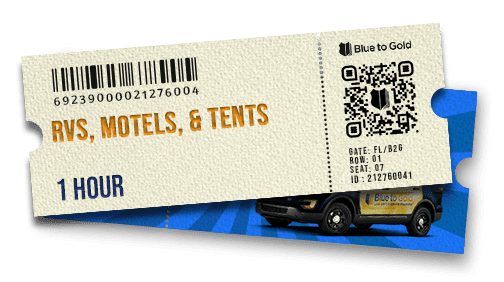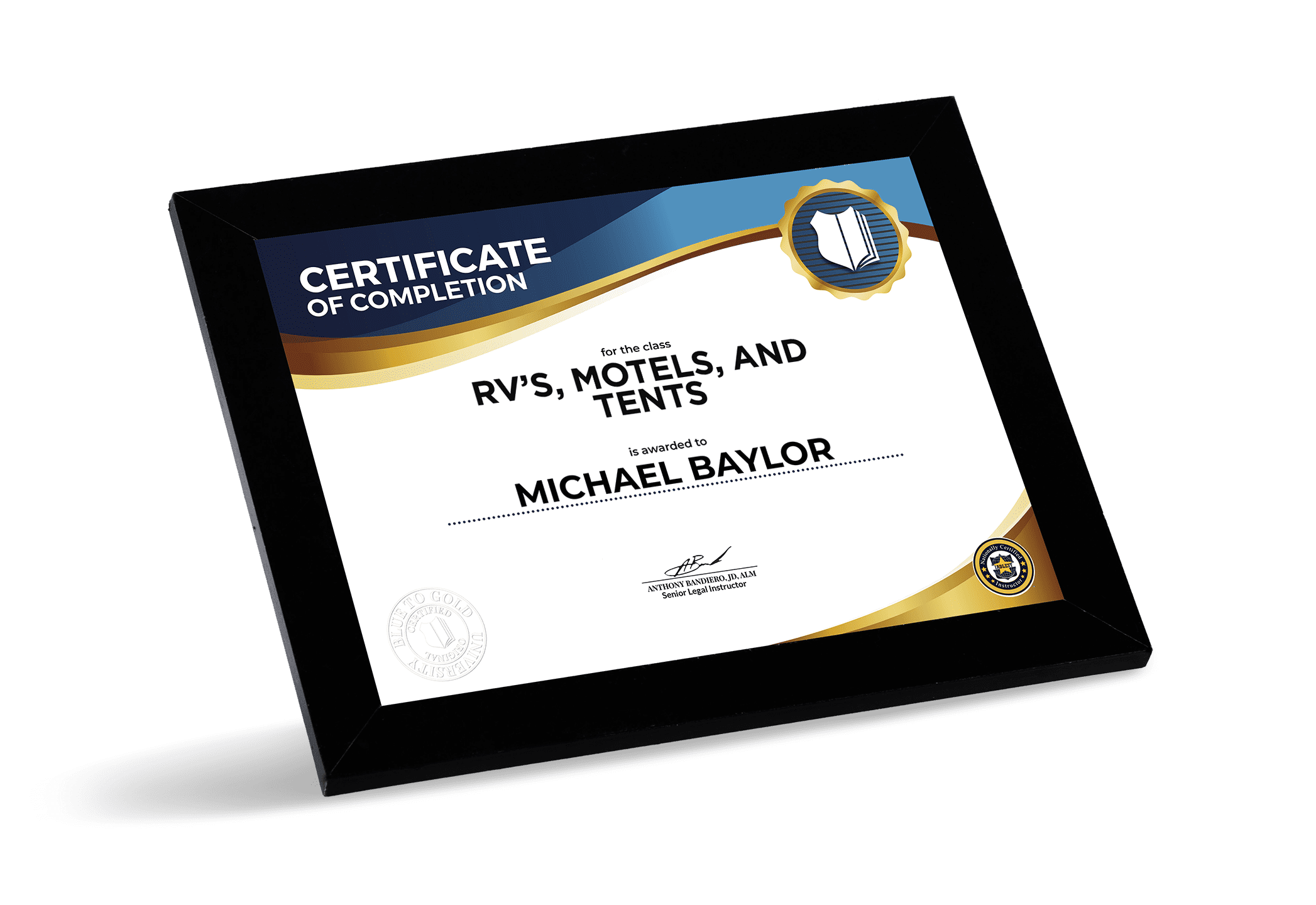Module One: Course Introduction
1. Instructor Introduction.
2. Explain the course objective.
3. Encourage attendees to ask questions and share feedback with other attendees.
4. Explain that certificates will be emailed after the class.
5. Go over the three disclaimers:
- Laws and agency standard operating procedures may be more Blue to Gold teaching the federal standard unless otherwise stated. Therefore, students must know their state and local requirements in addition to the federal standard.
- If students have any doubts about their actions, ask a supervisor or legal
- The course is not legal advice, but legal education. Therefore, nothing we teach should be interpreted as legal Check with your agency’s legal advisor for legal advice.
Module Two: RVs
1. Explain the legal rule: The motor vehicle exception usually applies to recreational vehicles, even if lived in.
2. Whether an RV is a “vehicle” depends on various factors, including:
- Convenient access to a public road
- Permanent hook-ups
- Vehicle is registered
- Other vehicles being used as transportation
3. The motor vehicle exception has four requirements:
- Probable cause
- Not within curtilage
- Apparently mobile
- Don’t exceed scope
4. What about disabled RVs? If AAA could help them get on their way it’s considered “mobile” under the motor vehicle exception.
5. Case Example:
- Vehicle exception to search warrant requirement did not justify warrantless search of defendants’ motor home, as motor home was so situated that objective observer would conclude that it was not being used for transportation, but as residence, where motor home was located on defendants’ private rural wooded lot, electric generator was operating at time of defendants’ arrest, other motor vehicles used for transportation were located on property, defendants’ personal effects were in motor home, and there was no convenient or easy access to public road. U.S.C.A. Const.Amend. 4. United States v. Adams, 845 F. Supp. 1531 (M.D. Fla. 1994)
6. The motor vehicle exception also applies to pull
7. Case example:
- Defendant who had been indicted for possession of more than 100 kilograms of marijuana with intent to distribute moved to suppress marijuana seized during warrantless search of camper-trailer. The United States District Court for the Western District of Texas, Lucius Desha Bunton, III, Chief Judge, granted defendant’s motion to suppress, and Government The Court of Appeals, Barksdale, Circuit Judge, held that: (1) warrantless search of camper- trailer fell within automobile exception to warrant requirement, and (2) border agents had “probable cause” for search based, inter alia, on driver’s late arrival and short stay at site of suspected narcotics transaction. Reversed and remanded. United States v. Ervin, 907 F.2d 1534 (5th Cir. 1990)
8. Explain that the cops generally conduct the search in the same manner as if they had a
Module Three: Motels
1. Explain the legal rule: Hotels generally enjoy the same protections as a home…but there are real-world limitations.
2. Explain some of the rules surrounding evicting occupants, including:
- Hotels have a common law right to immediately evict for “cause”
- Let the hotel decide what to do!
- Maintain reasonable safety measures
- You can search room after eviction
- Non-abandoned items cannot be searched by police
3. Case example:
- Police could properly search arrestee’s former motel room pursuant to consent of motel’s assistant manager, after manager had repossessed room for nonpayment of rent; arrestee had no reasonable expectation of privacy in room after rental period had expired. United States v. Huffhines, 967 2d 314 (9th Cir. 1992)
4. Case example:
- In the early morning hours of January 6, 2006, the night manager of the Ramada Inn Hotel in Grand Forks, North Dakota, contacted the Grand Forks Police, requesting assistance with quelling a disturbance in Room The manager explained that he had received several complaints about loud partying in the room. He told the police that he had seen many people entering and exiting the room and that he suspected illegal drug activity. The manager said that he had warned the occupants of the room to be quiet, and that he now wanted the police to help evict them.
- Officers Schauer, Jacobson, and Moe responded to the After speaking with the manager, the officers went with him to Room 101. As they stood outside, the officers heard loud noise and what they believed was a discussion about illegal drug trafficking. Officer Schauer briefly conferred with the hotel manager, who reiterated that he wanted the occupants evicted. Officer Schauer then knocked on the door and asked for permission to enter the room. A woman named Ashley Bigalke answered, but refused to allow the officers to enter the room because it was not hers and she did not know who had rented it. At that point, Officer Schauer told Bigalke that hotel management wanted everyone in the room evicted. He also stated that he was coming into the room and that all the occupants should gather their belongings and leave the hotel.
- Shortly after entering the room, Officer Jacobson recognized one of the occupants as Corey Molsbarger, for whom there were outstanding arrest warrants. Molsbarger was lying sideways on the bed, apparently asleep. The officers handcuffed Molsbarger and performed a search incident to In a nightstand next to the bed, the officers found a methamphetamine pipe and a small butane torch. Molsbarger was carrying $940 cash, and the officers found at the foot of the bed an empty beer box containing approximately one-half pound of methamphetamine, a small digital scale, and some marijuana. United States v. Molsbarger, 551 F.3d 809, 810– 11 (8th Cir. 2009)
5. Case example:
- “[A]s a general rule a defendant’s expectation of privacy in a hotel room expires at checkout However, … we hold that the policies and practices of a hotel may result in the extension past checkout time of a defendant’s reasonable expectation of privacy. The existence and duration of that expectation depend on the facts and circumstances in each case.” Dorais. United States v. Dorais, 241 F.3d 1124, 1127 (9th Cir. 2001)
6. This case proves courts look at hotel However, if hotel tells them to leave, then eviction is immediate.
7. Remind students that A suspect abandons any privacy interest in the room after he has been lawfully evicted.
8. Case example:
- Evidence was insufficient to establish defendant had abandoned motel room at the time of police officers’ initial entry and protective sweep because he fled the United States v. Ross, 941 F.3d 1058 (11th Cir. 2019), reh’g en banc granted, opinion vacated, 953 F.3d 744 (11th Cir. 2020)
9. You can serve an arrest warrant at a motel if:
- Valid arrest warrant
- Reason to believe fugitive is an occupant
- Reason to believe he’s currently present
Module Four: Tents
1. Explain that Tents and other temporary domiciles generally have some protections if they are lawfully erected or in a place for homeless encampements
2. Also, share that Notice and opportunity to remove an illegal encampment is an important factor to consider whether a person has a reasonable expectation of privacy in a
3. Case example:
- Defendant did not have a reasonable expectation of privacy in the campsite area outside his tent on public land, and thus police search of campsite did not violate defendant’s Fourth Amendment rights; camping on the open space preserve was prohibited without a permit, defendant had no authorization to camp within or otherwise occupy the public land, defendant had previously been cited for “illegal camping” and evicted from other campsites in the preserve, and the undeveloped, temporary campsite was a dispersed, ill- defined site, exposed and open to public view. People v. Nishi, 207 App. 4th 954, 143 Cal. Rptr. 3d 882 (2012)
4. Case example:
- The court in People Schafer, 946 P.2d 938 (Colo. 1997), held that the defendant in a robbery and weapons prosecution had a reasonable expectation of privacy in a tent which he pitched on publicly accessible vacant land that had not been fenced or posted against trespassing, for purposes of his challenge to the admissibility of evidence obtained in a warrantless search of the closed tent, and a backpack located therein, conducted by police officers while the defendant was away from the site. Affirming the trial court’s order suppressing the evidence, the court explained that the legitimacy of an individual’s expectation of privacy in a particular place or object is determined by considering the totality of the circumstances, including whether the individual has a possessory or proprietary interest in the areas or items that are the subject of the search.
5. Another key factor is to articulate some form of exigency
6. Case example:
- For example, in Alward State, 112 Nev. 141, 912 P.2d 243, 66 A.L.R. 5th 763 (1996), a camper directed a highway patrolman to his girlfriend’s body, which was found in a tent pitched on public land. After removing the body, the sheriff’s officers returned to the tent and, without seeking consent, searched the tent and removed it from the campsite. The court held that the camper had a subjective expectation of privacy in the tent and its contents because he left the tent and the objects in it closed. The court further found that the camper had an objective expectation of privacy as well, rejecting the government’s contrary assertion that no such expectation existed because the tent was on public land and the camper did not own the tent.
7. Case example:
- See Rolling v. State, 695 So. 2d 278 (Fla. 1997), reh’g denied, (June 12, 1997) and denied, 118 S. Ct. 448, 139 L. Ed. 2d 383 (U.S. 1997), in which the court accepted the trial court’s assumption that a trespasser who pitched a tent on land owned by a public university had a reasonable expectation of privacy in the tent. Police officers spotted the trespasser in a fenced, wooded area while patrolling in response to recent murders and bank robberies that had occurred nearby. The trespasser fled, but a canine tracking unit led police to the man’s campsite, where they found dye–stained money on the ground. Knowing that a bank robbery had occurred across the street the previous day, the officers decided to secure the tent. After a search dog went in and out of the tent, a deputy lifted the tent flaps to confirm that it was empty. Inside he saw a totebag on top of more dye–stained money. Concerned for the safety of his fellow officers and fearing that the trespasser might have returned to the site for a weapon, the deputy looked in the totebag and found a handgun in a gun box. Crime scene investigators subsequently removed various items from the campsite, including the tent, the totebag, and the handgun. A thorough search of the totebag 6 days later resulted in the discovery of items used in the murders. The appellate court agreed with the trial court’s conclusion that, despite the trespasser’s proprietary interest in the tent, the exigent circumstance of danger to police justified the initial search of the tent and the totebag, and the second search of the totebag was a valid inventory search.
8. Share with the students that the automobile exception may not apply to vehicles covered with tarp-style garages in camping areas.
9. Case example:
- defendant had reasonable expectation of privacy in tarp structure where car containing drugs was kept; 2 automobile exception to search warrant requirement did not authorize entry into tarp structure; and 3 automobile’s contents were not admissible under inevitable discovery exception to exclusionary People v. Hughston, 168 Cal. App. 4th 1062, 85 Cal. Rptr. 3d 890 (2008)
10. Explain to students that If a reasonable person would know that an illegal tent was subject to immediate ejectment and removal, then there is likely no reasonable expectation of privacy.
11. Examples of immediate ejectment:
- Living in cave on BLM land
- Living in picnic area
- Trespasser on forest land
- Defendant disclaimed any interest in the tent
- Box unlawfully erected on sidewalk
12. Also, students must remember entering and removing tents is one issue, “searching” their backpacks is another. Use a different doctrine for containers, like inventory, exigency, or warrant.
Module Four: Anti-Camping Enforcement
1. Explain that if a homeless person sleeping in a public space has no reasonable alternative to sleep somewhere else, then police must be cautious before taking enforcement actions.
2. Still, this does not mean cops should not enforce littering, open containers, blocking bus shelters and so forth.
3. Case example:
- Homeless persons brought § 1983 action challenging city’s public camping ordinance on Eighth Amendment The United States District Court for the District of Idaho, Ronald E. Bush, United States Magistrate Judge, 834 F.Supp.2d 1103, entered summary judgment in defendants’ favor, and plaintiffs appealed. The Court of Appeals, 709 F.3d 890, reversed and remanded. On remand, defendants moved for summary judgment, and the District Court, Bush, United States Magistrate Judge, 993 F.Supp.2d 1237, granted motion in part and denied it in part. Appeal was taken.
- Holdings: On denial of panel rehearing and rehearing en banc, the Court of Appeals, Berzon, Circuit Judge, held that:
- 1 homeless persons had standing to pursue their claims even after city adopted protocol not to enforce its public camping ordinance when available shelters were full;
- 2 plaintiffs were generally barred by Heck doctrine from commencing § 1983 action to obtain retrospective relief based on alleged unconstitutionality of their convictions;
- 3 Heck doctrine had no application to homeless persons whose citations under city’s public camping ordinance were dismissed before the state obtained a conviction;
- 4 Heck doctrine did not apply to prevent homeless persons allegedly lacking alternative types of shelter from pursuing
- 1983 action to obtain prospective relief preventing enforcement of city’s ordinance; and
- 5 Eighth Amendment prohibited the imposition of criminal penalties for sitting, sleeping, or lying outside on public property on homeless individuals who could not obtain shelter. Martin City of Boise, 920 F.3d 584 (9th Cir.), cert. denied sub nom. City of Boise, Idaho v. Martin, 140 S. Ct. 674, 205 L. Ed. 2d 438 (2019)
4. Share these quotes from the case:
- “the Eighth Amendment’s prohibition on cruel and unusual punishment bars a city from prosecuting people criminally for sleeping outside on public property when those people have no home or other shelter to go ”
- The holding was narrow and did not “dictate to the City that it must provide sufficient shelter for the homeless, or allow anyone who wishes to sit, lie, or sleep on the streets … at any time and at any place.”
- The court also noted that “an ordinance prohibiting sitting, lying, or sleeping outside at particular times or in particular locations might well be constitutionally permissible,” as well as “an ordinance barring the obstruction of public rights of way or the erection of certain ”
Module Four: Takeaways
1. Evictions: Focus on officer safety and need to make orderly eviction
2. RVs: They are usually vehicles not domiciles
3. Tents: if lawfully erected or allowed to stay, treat like home.












